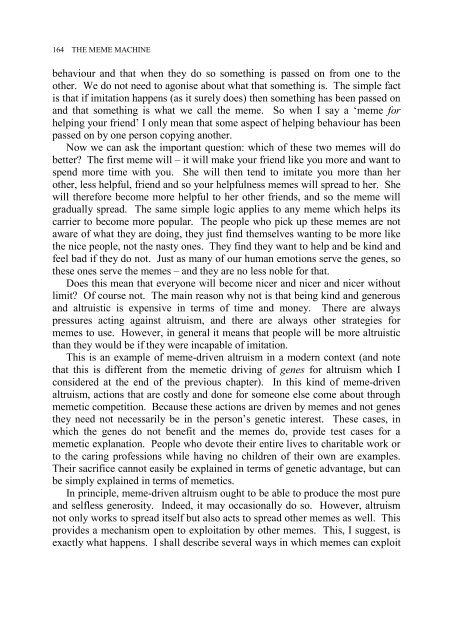The Meme Machine
TheMemeMachine1999
TheMemeMachine1999
- No tags were found...
Create successful ePaper yourself
Turn your PDF publications into a flip-book with our unique Google optimized e-Paper software.
164 THE MEME MACHINE<br />
behaviour and that when they do so something is passed on from one to the<br />
other. We do not need to agonise about what that something is. <strong>The</strong> simple fact<br />
is that if imitation happens (as it surely does) then something has been passed on<br />
and that something is what we call the meme. So when I say a ‘meme for<br />
helping your friend’ I only mean that some aspect of helping behaviour has been<br />
passed on by one person copying another.<br />
Now we can ask the important question: which of these two memes will do<br />
better? <strong>The</strong> first meme will – it will make your friend like you more and want to<br />
spend more time with you. She will then tend to imitate you more than her<br />
other, less helpful, friend and so your helpfulness memes will spread to her. She<br />
will therefore become more helpful to her other friends, and so the meme will<br />
gradually spread. <strong>The</strong> same simple logic applies to any meme which helps its<br />
carrier to become more popular. <strong>The</strong> people who pick up these memes are not<br />
aware of what they are doing, they just find themselves wanting to be more like<br />
the nice people, not the nasty ones. <strong>The</strong>y find they want to help and be kind and<br />
feel bad if they do not. Just as many of our human emotions serve the genes, so<br />
these ones serve the memes – and they are no less noble for that.<br />
Does this mean that everyone will become nicer and nicer and nicer without<br />
limit? Of course not. <strong>The</strong> main reason why not is that being kind and generous<br />
and altruistic is expensive in terms of time and money. <strong>The</strong>re are always<br />
pressures acting against altruism, and there are always other strategies for<br />
memes to use. However, in general it means that people will be more altruistic<br />
than they would be if they were incapable of imitation.<br />
This is an example of meme-driven altruism in a modern context (and note<br />
that this is different from the memetic driving of genes for altruism which I<br />
considered at the end of the previous chapter). In this kind of meme-driven<br />
altruism, actions that are costly and done for someone else come about through<br />
memetic competition. Because these actions are driven by memes and not genes<br />
they need not necessarily be in the person’s genetic interest. <strong>The</strong>se cases, in<br />
which the genes do not benefit and the memes do, provide test cases for a<br />
memetic explanation. People who devote their entire lives to charitable work or<br />
to the caring professions while having no children of their own are examples.<br />
<strong>The</strong>ir sacrifice cannot easily be explained in terms of genetic advantage, but can<br />
be simply explained in terms of memetics.<br />
In principle, meme-driven altruism ought to be able to produce the most pure<br />
and selfless generosity. Indeed, it may occasionally do so. However, altruism<br />
not only works to spread itself but also acts to spread other memes as well. This<br />
provides a mechanism open to exploitation by other memes. This, I suggest, is<br />
exactly what happens. I shall describe several ways in which memes can exploit



